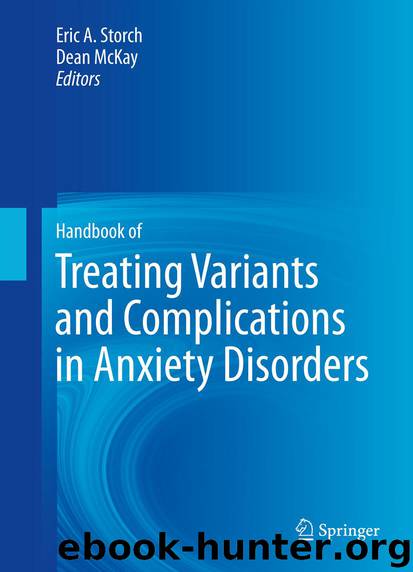Handbook of Treating Variants and Complications in Anxiety Disorders by Eric A. Storch & Dean McKay

Author:Eric A. Storch & Dean McKay
Language: eng
Format: epub
Publisher: Springer New York, New York, NY
Trauma Memory Characteristics
The treatment of PTSD among clients with BPD is often complicated by both the quantity and quality of their trauma memories.
Large quantity of trauma memories. While many individuals with PTSD report multiple traumas, individuals with BPD often report particularly extensive trauma histories. Indeed, repeated abusive experiences, multiple types of abusive experiences, multiple perpetrators of abuse, and early age of onset of abuse in childhood have been found to distinguish BPD from other diagnostic groups (Herman, Perry, & van der Kolk, 1989; Ogata et al., 1990; Zanarini et al., 1997), and the majority of individuals with BPD continue to experience traumatic events as adults (e.g., Zanarini et al., 2005). In addition, nearly all clients with BPD report experiences of neglect, emotional and verbal abuse, emotional withdrawal by a caretaker, and/or chronic invalidation (Zanarini et al., 1997), which, despite not constituting “trauma” according to Criterion A of the PTSD diagnosis (APA, 2000), are often reported by clients with BPD to be among their most distressing experiences. The sheer number of traumatic events experienced by clients with BPD is likely to complicate PTSD treatment.
Poor quality of trauma memories. To complete imaginal exposure for PTSD, individuals must remember at least some details of a traumatic event. While many individuals with PTSD have elaborated memories, some have only short or fragmented memories, particularly those whose PTSD is related to childhood abuse. Many clients with BPD are not able to remember enough details about their trauma(s) to create an elaborated narrative, and some have only fragmented memories or brief images of certain events. The degraded memory quality reported by many clients with BPD is likely explained by a number of factors, such as the early age of trauma onset, peritraumatic dissociation, and autobiographical memory overgenerality (e.g., Crane & Duggan, 2009; Eisen & Lynn, 2001). Importantly, these types of brief memories and images often cause significant distress and are frequently reexperienced as intrusive memories, flashbacks, and nightmares. The treatment of individuals with very fragmented trauma memories is often challenging in part due to concerns about the possibility of reifying “false memories” (see McNally, 2003 for a review of this topic).
Download
This site does not store any files on its server. We only index and link to content provided by other sites. Please contact the content providers to delete copyright contents if any and email us, we'll remove relevant links or contents immediately.
When Breath Becomes Air by Paul Kalanithi(7264)
Why We Sleep: Unlocking the Power of Sleep and Dreams by Matthew Walker(5642)
Paper Towns by Green John(4169)
The Immortal Life of Henrietta Lacks by Rebecca Skloot(3826)
The Sports Rules Book by Human Kinetics(3588)
Dynamic Alignment Through Imagery by Eric Franklin(3489)
ACSM's Complete Guide to Fitness & Health by ACSM(3469)
Kaplan MCAT Organic Chemistry Review: Created for MCAT 2015 (Kaplan Test Prep) by Kaplan(3423)
Introduction to Kinesiology by Shirl J. Hoffman(3301)
Livewired by David Eagleman(3122)
The River of Consciousness by Oliver Sacks(2992)
Alchemy and Alchemists by C. J. S. Thompson(2911)
The Death of the Heart by Elizabeth Bowen(2901)
Descartes' Error by Antonio Damasio(2731)
Bad Pharma by Ben Goldacre(2730)
Kaplan MCAT Behavioral Sciences Review: Created for MCAT 2015 (Kaplan Test Prep) by Kaplan(2492)
The Gene: An Intimate History by Siddhartha Mukherjee(2491)
The Fate of Rome: Climate, Disease, and the End of an Empire (The Princeton History of the Ancient World) by Kyle Harper(2436)
The Emperor of All Maladies: A Biography of Cancer by Siddhartha Mukherjee(2431)
